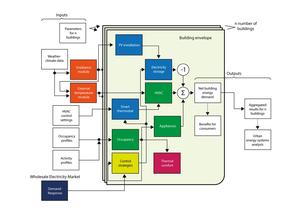RENOVERTY and the DREEM Model: Innovation for energy efficiency in rural areas

The RENOVERTY project aims to fill the gaps in addressing energy poverty and promoting energy-efficient renovations in vulnerable rural areas in Central, Eastern, and Southern Europe. These areas are particularly at risk of energy poverty due to specific characteristics such as geographical isolation, energy inefficiency of buildings, lack of alternative energy sources, and other socioeconomic challenges.
The project involves the development of tailored "Energy Efficiency Roadmaps" for each of the pilot regions, such as the Parma region in Italy, Osona in Spain, Coimbra in Portugal, and others in Hungary, Croatia, Estonia, and Slovenia. These roadmaps, developed in collaboration with local stakeholders, aim to promote effective and replicable renovations in similar contexts.
The DREEM model (Dynamic high-Resolution dE-mandsidE Management) is a tool used to assess various energy efficiency measures based on their energy-saving potential and techno-economic feasibility. The measures considered include external wall insulation, replacing windows with double glazing, roof insulation, upgrading heating systems (gas, biomass, or heat pumps), and efficient lighting (LED lamps).
Modeling results show that the effectiveness of the measures strongly depends on the initial condition of the building and the existing heating systems. This highlights the importance of targeted interventions to achieve significant improvements in energy efficiency and environmental sustainability.
The results obtained are compiled in the document titled "Evaluation of energy efficiency measures addressing the needs of energy poor households in rural areas", which is currently available only in English (here). This document represents a key reference for those who wish to delve deeper into the solutions adopted and the benefits achieved in terms of energy savings and improved quality of life in the studied households.
In the document, you can find detailed information about the energy audits carried out in the seven pilot countries involved in the project: Italy, Spain, Portugal, Croatia, Slovenia, Hungary, and Estonia. For each country, detailed data were collected regarding the energy performance of the buildings, structural characteristics, and the energy consumption habits of the inhabitants. This information allowed the identification of the main areas for intervention and the development of specific solutions for each geographical and climatic context.
The document also reports on the evolution and modifications of the DREEM model during its application, as well as the results obtained from applying the model. These results include, in particular, an accurate evaluation of the current energy performance of the analyzed buildings, an estimation of the potential energy savings from implementing the proposed efficiency measures, and an analysis of the environmental impact associated with reducing energy consumption.
A relevant aspect also concerns the analysis of thermal comfort within the buildings. Thanks to the proposed solutions, it has been possible to improve living comfort by reducing heat loss and optimizing the use of energy resources, especially during winter and summer months. Finally, the document concludes with a series of techno-economic evaluations, demonstrating that energy efficiency measures not only enable significant energy savings but are also economically sustainable in the long term. These evaluations highlight the benefits not only for families, who can enjoy lower energy bills, but also for the environment, thanks to the reduction of greenhouse gas emissions.
 Print
Print